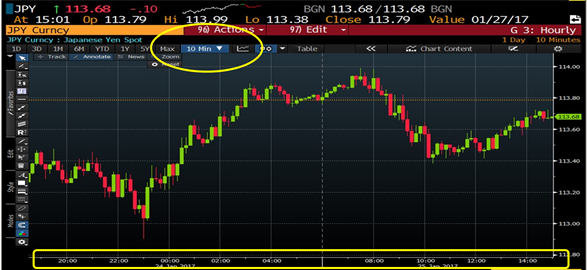www.pzhconsultants.com
在上回,我们讨论了计划交易策略的时间范围的重要性。我们的交易时间范围可以使我们在评估市场的变化时拥有正确的时间观点。这也有助于我们保持纪律,不会超于原有预定的期限保留亏损的头寸。在“交易策略的必备关键要素”的第二节 (下)中,我们将探讨它如何影响我们交易的其他方面。
时间范围会影响我们如何调整我们的市场分析工具
首先,我们的时间范围会影响我们如何调整我们的市场分析工具。如果我们是日间交易者,则必须确保我们运用的图表是以分钟或每小时汇报的图表,而不是每日或每周的图表。理由很简单,对于日间交易者,他的重点应该放在分析日内市场的波动。因此,如果他要查看每日或每周图表,那他可能被较长期的讯息扰乱他的超短期交易策略。这是许多交易员的常见错误。
长期交易者,其看市场的“镜片”应相应地更长
相反的,对于每日或长期交易者,其看市场的“镜片”应相应地更长。这能避免市场的短期波动影响他的市场分析。(但是,长期交易者可以查看日内图表以更有善地执行交易指令。此处的目是为了更维系地来优化其入场的价位。这在日间交易波动性很高时尤其重要。关键是他运用短期图,仅作执行之用,不作市场分析之用。)
策略预定的时间范围也会影响我们为每笔交易分配的资源
我们策略预定的时间范围也会影响我们为每笔交易分配的资源。头寸持有的时间越长,该头寸应当遭受到的价格波动也越高。因资源的有限,较大的波动意味着我们必须持有较小的头寸部位和(或)减少我们的交易量。这也是为什么日间交易者通常的交易量较大但他们的每日损益波动也较小的原因。他们一天之内有很多交易,但是每笔交易所承受的风险也相对较小。相反的,长期交易者的交易量少得多,但每笔交易都可以承受更大的损益波动。他甚至可能相应地减少每笔交易的头寸部位来相对地承头寸所受到的更大损益波动。
因此,至关重要的是,在规划交易策略时必须有一个设定的交易时间范围,以便我们有正确的时间观点。这应该在我们执行交易之前完成,以确保我们保持交易纪律。在我们的下节“交易策略的必备关键要素”中,我们将讨论“进场与平仓水平”以及它们如何对我们的交易策略的成功至关重要。敬请关注与期待!
如想回顾“交易策略的必备关键要素”的上几节课,请到以下查询:
Disclaimer:www.pzhconsultants.com/disclaimer
Principles of Trading Series:Critical Trading Strategy Components – Part 2b
In previous session, we have covered the importance of recognising the time horizon which we plan our trade strategy. Defining our trading time horizon allows us to have the right time perspective when we assess the changes in the market vis-à-vis our strategy.It also helps us maintain discipline and prevent us over staying in our positions. In this second part of “Trading Time Horizons”, we shall touch on how it affects the other aspects of our trading.
Firstly, our time horizon affects how we calibrate our market analytical tools. If we are a day trader, we have to ensure that the charts that we are reading are minutes or hourly chart rather daily or weekly charts. The rational is simple.For a day trader, his focus should be on the INTRA-day market fluctuation. Therefore if he were to look at daily or weekly charts, then he will be planning for time horizons outside his defined strategy. This is a common mistake among traders.While he is distracted by the market trends over the days or weeks, he loses sight of his goal which is to capture the intra-days’ moves.
For the daily or longer term trader, his market “lens” should be correspondingly longer. This will allow him to ignore the market intraday noises and focus on capturing the trends as defined by his time horizon. (However, it is possible for a longer term trader to look at intraday charts as a way to refine his trade execution. The purpose here is to time his buy or sell trades in order to optimize his entry levels. This is especially relevant when intraday volatility is high.The key here is that he is looking at a shorter term chart for execution purposes only, not for his market analysis)
Our strategy’s defined time horizon will also influence the resources that we would need to allocate for each trade. The longer the time horizon, the bigger the swings we can expect that trade to go through from a market price perspective.With a bigger mark-to-market price swing and given that trading capital are finite, it would imply that we would need to trade with a smaller size and/or with a lesser frequency. This is the reason why intra-day traders are usually high volume but they tend to have lower profit and loss fluctuations. They have many trades within a day but each trades risks relatively little in terms of the overall capital. Conversely, the longer term trader has much fewer trades but each trade can tolerate a much bigger profit and loss swing.He might even reduce this notional size of each trade accordingly to sustain this profit and loss swing.
Therefore, it is critical that we have a defined time horizon when we plan our trade strategy so that we will have the correct time perspective. This should be done BEFORE we execute our trade to ensure we maintain discipline. In our next session, of “Critical Trading Strategy Components” we shall be discussing “Entry and Exit levels” and how they critical to the success of our trading strategy.Please stay tuned!
From those that are interested to catch up on the past publications of: “Critical Trading Strategy Components”, below are the links:
Disclaimer:www.pzhconsultants.com/disclaimer
$黄金主连(GCmain)$ $白银主连(SImain)$ $WTI原油主连(CLmain)$ $SP500指数主连(ESmain)$ $NQ100指数主连(NQmain)$ $道琼斯指数主连(YMmain)$


精彩评论